Defecation
Defecation is the final act of digestion, by which organisms eliminate solid, semisolid, or liquid waste material from the digestive tract via the anus. Humans and many other animals have a gastrointestinal tract that processes food to extract energy and nutrients, resulting in waste products. Defecation is a critical biological function in humans and animals, ensuring the removal of waste and toxins from the body.
Process[edit | edit source]
The process of defecation begins in the colon, where the waste material is stored until the rectum becomes full. This fullness signals the need to evacuate the bowels, a process controlled by the nervous system. The brain receives signals from the rectum indicating that it is full, and in response, initiates the defecation reflex. This involves relaxation of the internal anal sphincter and an involuntary contraction of the colon and rectal muscles, pushing the waste material out of the body. Voluntary control over the external anal sphincter allows the process to be initiated or delayed by the individual.
Health Aspects[edit | edit source]
Regular defecation is an important aspect of health. The frequency of bowel movements can vary greatly between individuals, from several times a day to a few times a week, without necessarily indicating a health problem. However, changes in bowel habits, such as constipation or diarrhea, can be symptomatic of underlying health issues. Constipation, characterized by infrequent or difficult bowel movements, can be caused by a lack of fiber in the diet, inadequate hydration, or lack of physical activity. Diarrhea, on the other hand, involves frequent, watery bowel movements and can result from infections, irritable bowel syndrome (IBS), or other conditions.
Cultural and Social Aspects[edit | edit source]
Cultural attitudes towards defecation vary widely. In many cultures, defecation is a private act, conducted in toilets or latrines and surrounded by norms and taboos. The design and availability of sanitation facilities can significantly impact public health, especially in developing countries where access to clean water and sanitation is limited. The World Health Organization (WHO) and other international bodies have initiatives aimed at improving sanitation worldwide to prevent diseases associated with poor hygiene and sanitation.
Environmental Impact[edit | edit source]
The management of human waste is a significant environmental issue. Inadequate sanitation systems can lead to the contamination of water sources, soil, and food supplies, posing serious health risks. Sustainable sanitation solutions, such as composting toilets and biogas digesters, are being explored to reduce the environmental impact of human waste.
Search WikiMD
Ad.Tired of being Overweight? Try W8MD's NYC physician weight loss.
Semaglutide (Ozempic / Wegovy and Tirzepatide (Mounjaro / Zepbound) available. Call 718 946 5500.
Advertise on WikiMD
|
WikiMD's Wellness Encyclopedia |
| Let Food Be Thy Medicine Medicine Thy Food - Hippocrates |
Translate this page: - East Asian
中文,
日本,
한국어,
South Asian
हिन्दी,
தமிழ்,
తెలుగు,
Urdu,
ಕನ್ನಡ,
Southeast Asian
Indonesian,
Vietnamese,
Thai,
မြန်မာဘာသာ,
বাংলা
European
español,
Deutsch,
français,
Greek,
português do Brasil,
polski,
română,
русский,
Nederlands,
norsk,
svenska,
suomi,
Italian
Middle Eastern & African
عربى,
Turkish,
Persian,
Hebrew,
Afrikaans,
isiZulu,
Kiswahili,
Other
Bulgarian,
Hungarian,
Czech,
Swedish,
മലയാളം,
मराठी,
ਪੰਜਾਬੀ,
ગુજરાતી,
Portuguese,
Ukrainian
Medical Disclaimer: WikiMD is not a substitute for professional medical advice. The information on WikiMD is provided as an information resource only, may be incorrect, outdated or misleading, and is not to be used or relied on for any diagnostic or treatment purposes. Please consult your health care provider before making any healthcare decisions or for guidance about a specific medical condition. WikiMD expressly disclaims responsibility, and shall have no liability, for any damages, loss, injury, or liability whatsoever suffered as a result of your reliance on the information contained in this site. By visiting this site you agree to the foregoing terms and conditions, which may from time to time be changed or supplemented by WikiMD. If you do not agree to the foregoing terms and conditions, you should not enter or use this site. See full disclaimer.
Credits:Most images are courtesy of Wikimedia commons, and templates, categories Wikipedia, licensed under CC BY SA or similar.
Contributors: Prab R. Tumpati, MD




